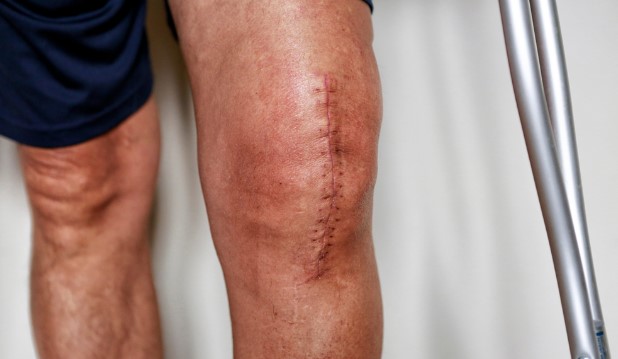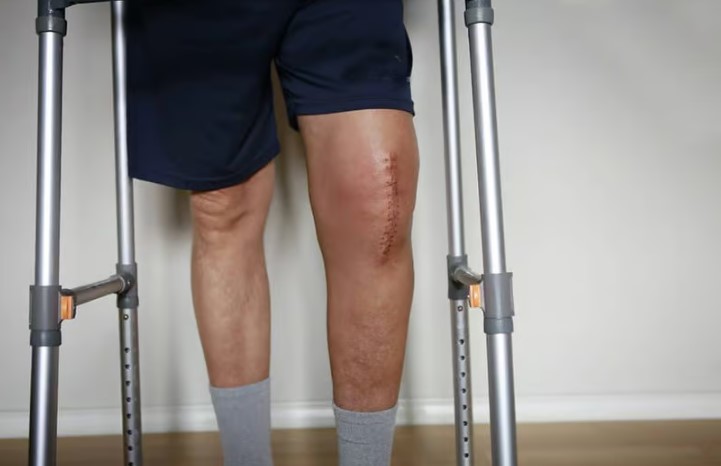Having performed numerous successful knee replacement surgeries in my career as an orthopedic surgeon, I’ve noticed that the post-operative journey plays a critical role in determining the long-term success of the procedure. This article aims to highlight the top 5 mistakes after knee replacement and provide insightful advice on how to avoid them. As we journey together in this article, my hope is that you’ll feel empowered, informed, and excited about your recovery process. Let’s get started!
1. Rushing the Recovery Process

One of the most frequent mistakes I observe in my practice is patients trying to rush their recovery process. Knee replacement surgery is a major procedure and the body requires ample time to heal. Forcing your knee to perform strenuous activities prematurely can lead to complications such as infection, joint instability, and even re-injury.
Takeaway: Be patient with your body. Follow your physical therapist’s advice and remember, a slow and steady recovery often leads to the best outcomes.
2. Physical Therapy Recommendations
Another common pitfall post-knee replacement is neglecting physical therapy. A tailored exercise regimen is crucial in strengthening the muscles around your new knee joint and improving flexibility. Skipping sessions or not performing the exercises correctly can hinder your recovery.
Takeaway: Treat your physical therapy sessions as non-negotiable appointments in your recovery journey. The diligence you put into this stage directly influences your future mobility.
3. Neglecting Pain and Discomfort
Following knee replacement surgery, some degree of discomfort is expected. However, persistent or severe pain can be a warning sign of complications such as infection or prosthesis issues. Ignoring these signs and not communicating them to your doctor promptly is a common misstep.
Takeaway: Always communicate any unusual or persistent pain to your doctor promptly. Remember, pain is your body’s way of signaling that something might be off.
4. Making Dietary Blunders
Many people overlook the importance of nutrition in the recovery process. A healthy, balanced diet provides your body with essential nutrients required for healing. On the other hand, excessive consumption of inflammatory foods, such as sugars and processed foods, can slow down your recovery.
Takeaway: Prioritize a balanced, nutritious diet rich in protein, vitamins, and minerals to support your healing process.
5. Avoiding Assistive Devices
It’s common for individuals to avoid using assistive devices like crutches or walkers after surgery, often due to a desire for independence or perceived stigma. However, these devices provide crucial support, stability, and safety during your recovery.
Takeaway: Embrace assistive devices as necessary tools on your path to recovery. They’re designed to support your mobility and independence in the safest way possible.
Essential Post-Operative Strategies

Armed with the knowledge of top 5 mistakes after knee replacement to avoid, let’s explore practical strategies you can embrace to boost your recovery. Understanding these actions can instill confidence and enthusiasm in your post-operative journey.
1. Embrace a Slow and Steady Recovery
Remember, rushing will do you no good. Your body has undergone a significant procedure and it needs time to heal and adjust.
Action Steps: Avoid strenuous activities initially. Listen to your body and don’t push yourself too hard too soon. As the old saying goes, “Slow and steady wins the race.” This holds true for your recovery journey.
2. Commit to Your Physical Therapy
Physical therapy is your ticket to regaining strength and flexibility in your new knee.
Action Steps: Make a commitment to attend all your physical therapy sessions and perform the exercises as instructed. This commitment is one of the biggest factors determining the success of your knee replacement.
3. Communicate With Your Medical Team
Keeping an open line of communication with your medical team is key in identifying any potential issues early.
Action Steps: Don’t hesitate to reach out to your doctor or therapist if you notice any persistent or severe pain, swelling, or any other unusual signs.
4. Adopt a Nutrient-Rich Diet
The importance of nutrition during your recovery cannot be overstated. Your body needs the right nutrients to support the healing process.
Action Steps: Emphasize lean proteins, fruits, vegetables, and whole grains in your diet. Avoid inflammatory foods like sugars and processed items. A nutritionist can help create a tailored dietary plan for your recovery.
5. Use Assistive Devices
Lastly, don’t shun assistive devices. They are your allies in ensuring safe mobility during your recovery phase.
Action Steps: Use your walker, cane, or crutches as directed by your healthcare provider. They are tools meant to help you, not symbols of weakness or dependency.
Focusing on the Psychological Aspects of Recovery

While physical recovery is of paramount importance following a knee replacement surgery, we mustn’t overlook the psychological aspects. The road to recovery can be taxing emotionally and mentally. Staying positive, patient, and motivated can greatly impact your recovery outcomes.
1. Embrace a Positive Mindset
Keeping a positive mindset can help you deal with the challenges that arise during your recovery journey.
Action Steps: Practice positive affirmations, meditation, or any other techniques that help you maintain a positive outlook. Surround yourself with positive, supportive people and remember that each day brings you one step closer to full recovery.
2. Stay Patient
Patience is key to a successful recovery. It’s normal to experience ups and downs during the recovery process.
Action Steps: Whenever you feel impatient or frustrated with your progress, remind yourself of the progress you have made. Celebrate your small victories; they are stepping stones towards your overall success.
3. Stay Motivated
Motivation can fuel your commitment to physical therapy and other post-operative guidelines.
Action Steps: Set achievable recovery goals and celebrate when you reach them. Reward yourself in meaningful ways to keep your spirits high.
Frequently Asked Questions
Q: What are the long-term consequences of making mistakes during knee replacement rehabilitation?
A: Errors during the recovery phase can lead to complications such as infection, joint instability, prolonged pain, and, in severe cases, the need for revision surgery.
Q: Are there any specific activities to avoid after a knee replacement?
A: High-impact activities like running, jumping, and heavy lifting should be avoided initially. Your physical therapist will guide you on when it’s safe to resume these activities.
Q: Can physical therapy mistakes hinder the recovery process after knee replacement?
A: Yes, not adhering to your prescribed physical therapy regimen can slow down your recovery and may lead to reduced mobility.
Q: What precautions should I take to minimize post-operative errors after knee replacement surgery?
A: Key precautions include adhering strictly to your physical therapy regimen, being patient with your recovery, promptly communicating any discomfort or unusual signs to your medical team, maintaining a nutrient-rich diet, and using assistive devices as advised.
Q: How can I ensure a smooth and successful recovery after knee replacement?
A: Follow the strategies outlined in this article, keep a positive mindset, and maintain open communication with your medical team. Remember, your determination and adherence to post-operative guidelines will significantly influence your recovery.
Q: What are the signs that I may be making mistakes during my knee replacement rehabilitation?
A: Signs may include persistent or worsening pain, significant swelling, reduced mobility, or slow progress in physical therapy. If you notice any of these signs, consult your healthcare provider promptly.
Q: How can I keep a positive mindset during my recovery process?
A: Surround yourself with positivity, practice mindfulness, and celebrate your progress, no matter how small it may seem. Seek emotional support from loved ones or professional counselors if needed.
Q: Can my mindset really influence my recovery after knee replacement surgery?
A: Absolutely! A positive and motivated mindset can enhance your commitment to physical therapy and other post-operative guidelines, thus fostering a smoother and more successful recovery.
Q: How can I stay patient during the recovery process?
A: Patience comes with understanding that recovery is a process, not an event. Remember, each day of recovery is progress. Celebrate your small victories and trust in the recovery process.
Also Read: Justin Billingsley Brewster NY (Real Estate Consultant)
Conclusion
Your road to recovery after knee replacement surgery extends beyond the physical realm after this guide about top 5 mistakes after knee replacement. Embrace a positive mindset, cultivate patience, and stay motivated. By doing so, you can enhance your healing process, making your journey smoother and more successful.

